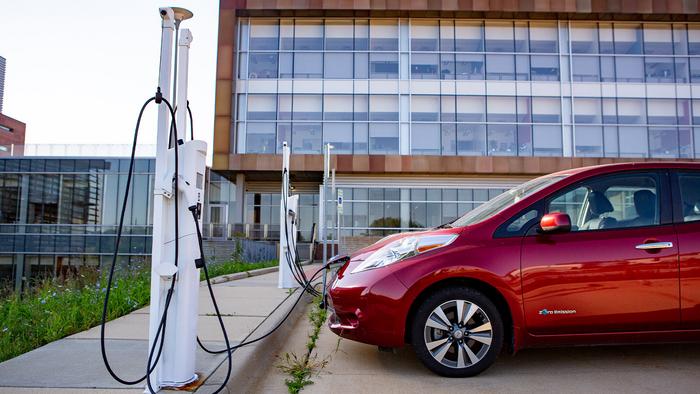A new tool launched by Argonne enables drivers to estimate, at the ZIP code level, how much they save on fuel costs by driving an electric vehicle.

Credit: (Image by Argonne National Laboratory.)
A new tool launched by Argonne enables drivers to estimate, at the ZIP code level, how much they save on fuel costs by driving an electric vehicle.
A new tool launched by the U.S. Department of Energy’s (DOE) Argonne National Laboratory enables drivers to estimate, at the ZIP code level, how much they save on fuel costs by driving a plug-in electric vehicle (either a plug-in hybrid (PHEV) or a battery electric vehicle (BEV)).
The tool, Driving Electric: Local Fuel Savings Calculator, is freely available to the public. Drivers can enter their ZIP code or state, as well as any information they have about their vehicle size, model year, tank size, fuel economy and annual mileage. The tool then generates estimates of how much drivers can save.
“Driving a plug-in electric vehicle rather than a conventionally fueled vehicle results in fuel cost savings and reduced greenhouse gas (GHG) emissions in more than 99% of U.S. ZIP codes,” said Yan (Joann) Zhou, principal transportation systems analyst in the Energy Systems and Infrastructure Analysis (ESIA) division at Argonne. “With this new tool, drivers can enter information about their vehicle, their location, annual mileage and local fuel prices and see how much they’re saving per mile, per tank and per year.”
“When more individuals choose to drive BEVs, they’re not only contributing to cleaner air — they can also enjoy significant cost savings for themselves.” — Dr. Zhou, principal transportation systems analyst at Argonne
The EV savings calculator is based on Argonne’s recently published technical report, Adoption of Plug-In Electric Vehicles: Local Fuel Use and Greenhouse Gas Emissions Reductions Across the U.S. With this report, scientists shed light on new information that previously was not well understood: How local factors like fuel and electricity costs can affect an individual’s savings — and how they can reduce GHG emissions — depending on where they live.
The researchers found that, compared to driving a gas vehicle of equivalent size, driving a BEV leads to significant savings of up to $2,200 annually. The largest fuel savings were found in areas with high gasoline prices, low electricity prices, preferences for larger vehicles and high annual mileage driven. Additionally, the researchers found that, compared to driving an equivalent gas vehicle, driving a PHEV leads to savings of up to $1,500 annually.
The report also examines the impact of GHG emissions, using a “well-to-wheels” approach, which considers the entire life cycle of a vehicle’s energy consumption. The investigators found that BEV drivers have the potential to save close to five tons of carbon dioxide equivalent per every 10,000 miles driven. “When more individuals choose to drive BEVs, they’re not only contributing to cleaner air — they can also enjoy significant cost savings for themselves,” said Xinyi Wu, a transportation systems analyst in the ESIA division and lead author of the report. “With this tool, individuals can now see just how much they can save based on where they live and how much they drive.”
Access the tool at energy.gov/local-fuel-savings.
This project was funded through DOE’s Office of Policy and Vehicle Technologies Office in the Office of Energy Efficiency and Renewable Energy.
Argonne National Laboratory seeks solutions to pressing national problems in science and technology. The nation’s first national laboratory, Argonne conducts leading-edge basic and applied scientific research in virtually every scientific discipline. Argonne researchers work closely with researchers from hundreds of companies, universities, and federal, state and municipal agencies to help them solve their specific problems, advance America’s scientific leadership and prepare the nation for a better future. With employees from more than 60 nations, Argonne is managed by UChicago Argonne, LLC for the U.S. Department of Energy’s Office of Science.
The U.S. Department of Energy’s Office of Science is the single largest supporter of basic research in the physical sciences in the United States and is working to address some of the most pressing challenges of our time. For more information, visit https://energy.gov/science.
DOI
Article Title
Adoption of Plug-in Electric Vehicles: Local Fuel Use and Greenhouse Gas Emissions Reductions Across the U.S.
Article Publication Date
1-Feb-2024



